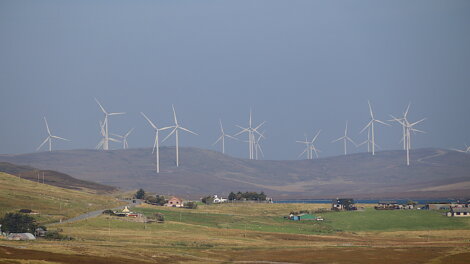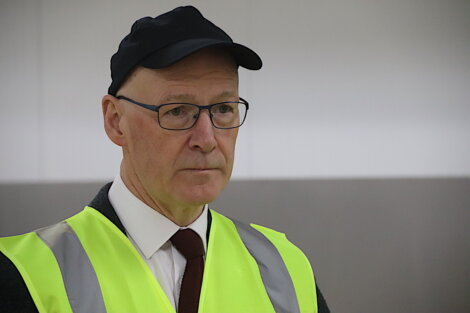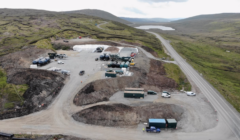Energy / Cost of energy concern ‘loud and clear’, first minister says
SCOTTISH first minister John Swinney says he has heard “loud and clear” on his trip to Shetland about the level of community benefit coming from the Viking Energy wind farm contrasted with the high fuel poverty in the isles.
The SNP leader said it is an issue he will take away from his discussions to identify “what more than government can do”.
Swinney was speaking during a trip to Shetland to attend a meeting of the Convention of the Highlands and Islands today (Monday), and to make a number of visits in Lerwick.
The convention meeting was opened by Shetland Islands Council leader Emma Macdonald who used the chance to highlight the contrast between the Viking wind farm – which developer SSE Renewables says could power up to 500,000 homes – and local people’s energy bills, which are among the highest in the country.
It comes after 103-turbine wind farm in Shetland’s Central Mainland, which is able to export power to the UK’s national grid by subsea cable, was formally launched earlier this summer.
While SSE Renewables is paying £5,000 per megawatt – £2.2 million a year – into a community benefit fund there still remains concern that islanders themselves with the turbines on their doorstep are getting a raw deal, with high levels of fuel poverty despite Shetland being a net exporter of power.
This hit especially hard with some when it was revealed SSE had received more than £2 million in August in “constraint payments” – where the developer is given money from the National Grid not to produce electricity when supply exceeds demand.
Speaking to the media on Monday, Swinney said there is “clearly a very significant concern” in Shetland regarding the level of community benefit and the “necessity to address that” in future developments.
Become a member of Shetland News
It comes as two offshore wind farms are proposed for the east of the isles, as well as potential hydrogen production in Shetland.
“I understand entirely the contrast between fuel poverty that people are experiencing, the disproportionally higher cost of fuel that will be the case and the higher necessity for fuel because of the comparative climate in Shetland, with the level of community benefit,” Swinney added.
“That’s an issue I’m going to take away from my discussions over the last couple of days to identify what more the government can do to try to strengthen that position.”
Meanwhile deputy first minister Kate Forbes, who was chairing the convention meeting, said big opportunities for Scotland in future energy developments – especially the Highlands and Islands – are “only opportunities if they deliver benefits to people”.
She acknowledged that local people may be frustrated with issues like high energy costs, transport infrastructure and access to opportunities.
“If we get it right, if we are able to deliver far more housing, if we’re able to deliver cheaper energy bills by working with the UK Government, then that will make the difference,” Forbes said.
“But we have to build the foundation stones for them to actually get the benefit when it works.”
However, the deputy first minister reiterated the responsibility for energy lies at Westminster, not Holyrood.
She said one scheme the government has been interested in previously is where a developer uses community benefit as a route to reduce energy bills.
But Forbes, who is also the cabinet secretary for the economy, said this is “really difficult to do”.
“There is an opportunity for them [the UK Government] to use the mechanisms at their disposal,” she added.
“You will have seen the striking comments from the chief executive of Octopus Energy, who said that actually Scotland should be paying the cheapest energy prices anywhere in Europe – indeed sometimes getting free energy if there was reform to the energy market.”
Become a member of Shetland News
Shetland News is asking its many readers to consider paying for membership to get additional features and services: -
- Remove non-local ads;
- Bookmark posts to read later;
- Exclusive curated weekly newsletter;
- Hide membership messages;
- Comments open for discussion.
If you appreciate what we do and feel strongly about impartial local journalism, then please become a member of Shetland News by either making a single payment, or setting up a monthly, quarterly or yearly subscription.













































































